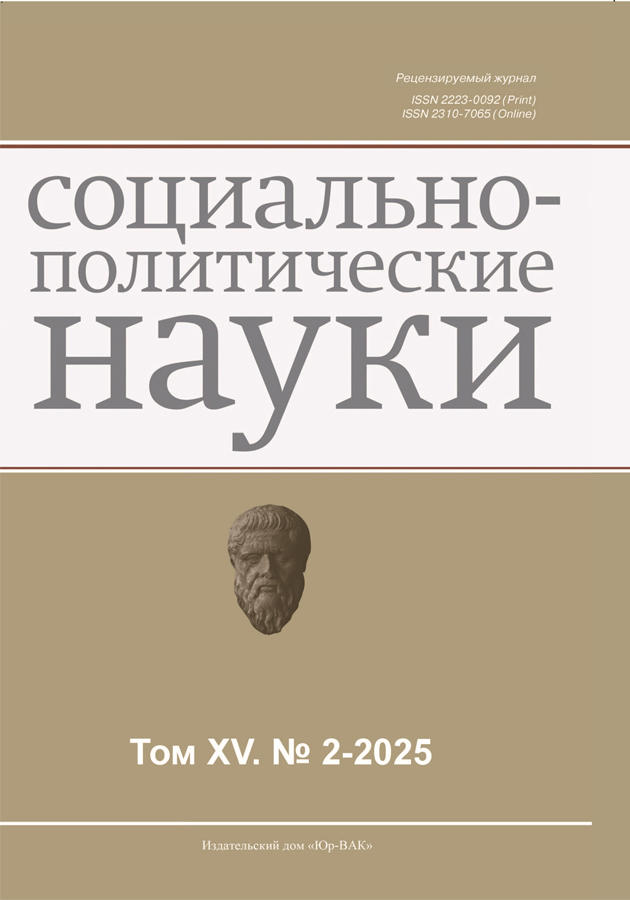Creative industries in the BRICS countries: legal and economic support measures and development prospects
- Autores: Pavlov V.P.1, Karmova K.A.1
-
Afiliações:
- Financial University under the Government of the Russian Federation
- Edição: Volume 15, Nº 2 (2025)
- Páginas: 215-222
- Seção: New issues in law
- URL: https://journals.eco-vector.com/2223-0092/article/view/681947
- DOI: https://doi.org/10.33693/2223-0092-2025-15-2-215-222
- EDN: https://elibrary.ru/OZPIXU
- ID: 681947
Citar
Texto integral
Resumo
The article analyzes the legal regulation of creative industries in the BRICS countries – China, the United Arab Emirates, India, Ethiopia, South Africa, Brazil, Iran and Egypt – with an emphasis on government support measures and prospects for their implementation in the Russian economy. The paper highlights the role of creative industries as a driver of innovation and economic growth in the context of globalization and digitalization. Each country is considered taking into account its unique features, and the importance of international cooperation in the field of creative industries is emphasized. It is concluded that it is necessary to improve the mechanisms for blocking pirated content and copyright infringing sites by making changes to a number of Russian legislative acts. It is proposed at the state level to consolidate the possibility of introducing “creative visa” programs through an information portal and special conditions for subjects of creative industries, as well as to develop regulations governing the creation and use of the register of traditional knowledge.
Palavras-chave
Texto integral
Sobre autores
Vladimir Pavlov
Financial University under the Government of the Russian Federation
Autor responsável pela correspondência
Email: VPPavlov@fa.ru
Código SPIN: 2602-5448
Dr. Sci. (Law), Professor, Professor Department of Legal Regulation of Economic Activity, Faculty of Law
Rússia, MoscowKamilla Karmova
Financial University under the Government of the Russian Federation
Email: karmova.kamilla@mail.ru
ORCID ID: 0009-0007-1142-1387
Faculty of Law
Rússia, MoscowBibliografia
- Brittoa Jorge. Revista de Economia Contemporânea. Journal of Contemporary Economics. 2016. No. 20 (3). Pp. 458–491. (In Rus.). doi: 10.1590/198055272034.
- Glushkova Yu.O., Vasina A.V. The impact of COVID-19 on the creative industries // Proceedings of the Saratov University New Series. Series: Economics. Management. Right. 2021. No. 1. Pp. 48–54. (In Rus.). doi: 10.18500/1994-2540-2021-21-1-48-54.
- Koroleva I.B., Sokolova I.L. Creative industries in Russia and the world: State, trends and problems of development management. Baikal Research Journal. 2022. Vol. 13. No. 3. P. 14. (In Rus.). doi: 10.17150/2411-6262.2022.13(3).14.
- Korsun D.D. A new model for the transformation of territorial positioning: Territorial rebranding of the UAE. Russian School of Public Relations. 2024. No. 32. Pp. 27–44. (In Rus.). doi: 10.24412/2949-2513-2023-32-27-44.
- Kuznetsova N.V. The new paradigm of modernity – creative economy. Asia-Pacific Region: Economics, Politics, Law. 2022. No. 1. Pp. 15–37. (In Rus.). doi: 10.24866/1813-3274/2022-1/15-37.
- Loguntsova I.V. Features of China’s creative economy. Public Administration. Electronic Bulletin. 2023. No. 98. Pp. 21–30. (In Rus.). doi: 10.24412/2070-1381-2023-98-21-30.
- Ruban D.A. Tourism and creative industries in international research experience: A geographical review. Services in Russia and Abroad. 2023. No. 5 (107). Pp. 59–68. (In Rus.). doi: 10.5281/zenodo.10423085.
- Serostanova O.B. Cultural industries and digital inclusion in the post-pandemic world. Science. Art. Culture. 2022. No. 4 (36). Pp. 44–57. (In Rus.)
- Urazova S.L. Creative industries: Visualization of communications and aestheticization of media forms. RUDN Journal of Studies in Literature and Journalism. 2023. Vol. 28. No. 3. Pp. 585–594. (In Rus.). doi: 10.22363/2312-9220-2023-28-3-585-594.
- Shkarina V.S. Creative economy: World experience and challenges for Russia. Bulletin of the Moscow University. Series 21. Management (State and Society). 2022. No. 4. Pp. 17–30. (In Rus.)
Arquivos suplementares









